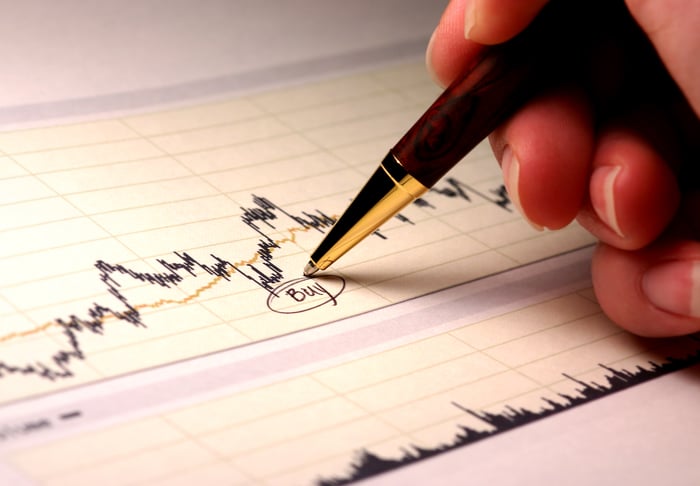No matter how well the stock market is performing, you'll never have to look far for a pundit calling for a crash or steep correction. Although we'll never know precisely when a crash or correction will occur, how long it'll last, or how steep the decline will be, one veritable certainty of investing is that ebbs and flows are commonplace.
In other words, it's not really a question of if a stock market crash will occur; it's simply a matter of how you'll react when one strikes.

Image source: Getty Images.
A stock market crash is inevitable
At the moment, there's no shortage of reasons why a market crash would make sense. Chief among them is the nosebleed valuation tied to the broad-based S&P 500 (^GSPC -1.11%). The S&P 500's Shiller price-to-earnings (P/E) ratio -- a measure of inflation-adjusted earnings over the last 10 years -- topped 38 this week, marking a nearly two-decade high. In each of the previous four instances where the S&P 500's Shiller P/E ratio topped and sustained 30, it eventually wound up declining by at least 20%.
There's also growing concern about rising inflation. A number of economists have suggested that trailing 12-month inflation is currently topping 5%, which would mark a more than one-decade high. Rapidly rising inflation could coerce the Federal Reserve to act faster than anticipated by raising interest rates and halting its quantitative easing program. Or to put things in simple terms, higher lending rates could squash the access to cheap capital that's fueled growth stocks for more than a decade.
Even history serves as a warning for the stock market. Putting aside the coronavirus crash, there have been eight other bear markets since the beginning of 1960. For each of these bear markets, there was at least one double-digit percentage pullback within three years of hitting bottom.
No matter how you slice the data, the catalysts for a crash are there, and at some point in the future a crash or steep correction will happen.
These Dow stocks would be perfect buys during a crash
Though this might sound like bad news, crashes are actually an incredible opportunity for long-term investors to put their money to work in great businesses at a discount. One of the quickest ways to find great businesses is to take a closer look at the Dow Jones Industrial Average (^DJI -0.42%). The Dow Jones is comprised of 30 highly successful, time-tested, multinational businesses that have made investors a fortune.
When the next stock market crash strikes, the following trio of Dow stocks can be comfortably bought hand over fist.

Image source: Getty Images.
Visa
If there's such a thing as a no-brainer buy in the Dow during a crash or steep correction, it's payment-processing kingpin Visa (V -0.44%).
The reason Visa's chart looks like a perpetual uptrend is because it's a cyclical company at the heart of a numbers game that strongly favors patient investors. Although Visa can be hurt by recessions (when consumers and businesses reduce their spending), the data pretty conclusively shows that economic contractions and recessions usually last no longer than a couple of quarters. Meanwhile, periods of economic expansion are often measured in years.
Though Visa does have to navigate its way through rough patches from time to time, the benefit of long-term economic expansion, and therefore higher spending from consumers and enterprises, disproportionately outweighs any hiccups it may encounter.
You'll also want to take note that Visa has an overwhelmingly large presence in the No. 1 market for consumption in the world: The United States. As of 2018, Visa controlled a 53% share of credit card network purchase volume in the U.S., which is more than 30 percentage points higher than its next-closest competitor, Mastercard. Following the Great Recession, Visa increased its market share lead in the U.S. by more than nine percentage points.
Another factor that makes Visa special is its lending avoidance. Visa processes payments and takes a small cut from its merchants -- that's it. Though it's giving up the opportunity to collect interest income and fees during long periods of expansion, avoiding lending also means Visa doesn't need to set aside cash when credit delinquencies rise, as is typical during recessions. Not having to set capital aside means a faster bounce-back from recessions than its peers, and it's what supports the company's 50%-plus profit margin.
Visa is the perfect example of a surefire Dow stock to buy during a crash.

Image source: Getty Images.
UnitedHealth Group
Read the fine print for any online brokerage, and they'll state in one way or another that "past performance is no guarantee of future results." But don't tell that to healthcare giant UnitedHealth Group (UNH 0.11%). This high-flying Dow stock has delivered 12 consecutive years of gains, including dividends, to its shareholders, and looks to be well on its way to lucky No. 13.
The first thing that makes UnitedHealth such a great stock to buy during a crash is the defensive nature of the healthcare sector. People don't stop getting sick just because the stock market has a poor couple of weeks or months. This highly predictable demand for healthcare services favors growth in both of UnitedHealth's core businesses.
Most folks are likely familiar with UnitedHealth's insurance operations. The great thing about insurance companies is that they're typically able to pass along higher premiums to cover rising future expenses. This ability to raise premiums on individual and enterprise members ensures that profitability will continue to tick higher over time.
UnitedHealth Group's second operating segment, Optum, might well be its most exciting. Optum is itself built on three segments which provide everything from pharmacy care and prescription filling services to the data analytics and software used by hospitals and health-centric organizations. Optum is consistently growing at a faster pace than the insurance segment, and more often than not it's generating a more impressive operating margin.
In short, UnitedHealth Group offers consistency, making it a smart Dow stock to buy when a crash occurs.

Image source: Getty Images.
Microsoft
A third Dow stock that should be on your buy list when the next stock market crash strikes is software behemoth Microsoft (MSFT -1.28%).
Like Visa, Microsoft is a cyclical company that could be negatively affected over the short run by a crash and/or recession. It's not uncommon to see tech stocks, which are often valued at a premium, take it on the chin during periods of heightened volatility. However, three key catalysts and disproportionately long periods of economic expansion make Microsoft a safe bet to make investors money over the long run.
To begin with, Microsoft has fully embraced cloud infrastructure services and cloud solutions. According to Canalys, Azure had the second-largest share of global cloud infrastructure spending during the first quarter. Meanwhile, the company's other cloud operations, including Dynamics, Office commercial, and Windows commercial, all grew year-over-year sales by at least 10% in the March-ended quarter. It might be hard to believe, but we're very likely still in the early stages of cloud infrastructure growth.
Secondly, don't overlook Microsoft's legacy operations. Even though Wall Street isn't looking for the company's Windows operating system (OS) to drive sales like it once did, Windows remains the most dominant OS for personal computers by a mile. Being able to generate consistently high margins and boatloads of cash flow from legacy operations is another piece of the puzzle.
The third and final puzzle piece is Microsoft's inorganic growth. Bringing in so much cash flow annually allows Microsoft to take chances on the acquisition front that most businesses can't. While not all of its deals will be winners, most of its acquisitions have ended up helping the company.
Investors can purchase Microsoft with confidence when the next crash rears its head.





